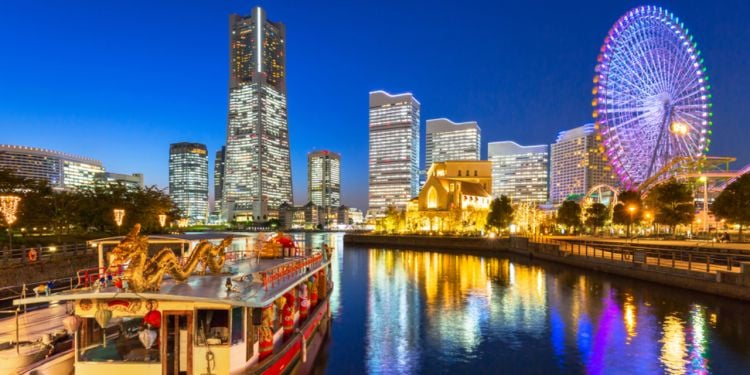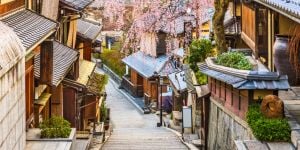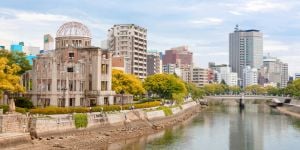
Yokohama is the second largest city in Japan after the capital, Tokyo. It is also the capital of Kanagawa Prefecture, has a population of more than 3.6 million, and takes advantage of its geographical position. Located less than one hour by train/subway from Tokyo, Yokohama attracts more and more tourists and expatriates every year, among which are many foreigners who choose to live in Yokohama rather than in the Tokyo megalopolis. How do you find a job in this port city? What are the main economic pillars there? Here is a practical guide.
Mapping Yokohama
History of the Port City
Yokohama is located south of Tokyo, in the Kanto region, on Honshu Island, the largest in Japan.
The first port city of Japan has managed to make a place for itself next to big Tokyo. The natives of Yokohama are called "hamakko", literally, the "children of the beach". The city's history is merged with the evolution of its port, which is an open door to the world. Through this port, the first exchanges with foreign countries occurred in the second half of the 19th century.
The small port of Yokohama became famous throughout Japan, fame extending beyond the Nippon archipelago's borders. Successive developments have transformed the discreet city into an economic pillar. Today, Yokohama takes advantage of its geographical position (in the center of Japan) to trade with the whole world.
The port city of the future
Located 40 km south of Tokyo, the port of Yokohama overlooks Tokyo Bay. It is the pride of the city. Opened to foreign trade in 1858, it has continued to thrive to become a major international port in Japan. This success can be appreciated at all levels, starting with jobs.
The port sector is a major employer with jobs in import/export, maritime expertise, shipping, customs, warehousing, logistics, engineering, stevedoring, tugboats, ship repair, inspection, etc. The influence of the port sector trickles down to the city's entire economy: restaurants, shops, museums, boutiques, etc. This is good news for expatriates looking for job opportunities in Yokohama.
The economy of Yokohama
Yokohama's economy is known as the "Yokohama economy ripple effect" driven by the port sector.
The port attracts major industries such as shipping, steel, automobiles, and tourism. They, in turn, attract the heavyweights of the hotel and restaurant industry, culture, and entertainment.
It is a natural virtuous circle that contributes to the expansion and dynamism of the entire prefecture, as well as a vibrant economy that attracts locals and foreigners alike.
Yokohama's economic health
In 2022, 32.1% of Yokohama's income and 30.8% of jobs came from port activity, for a revenue of more than 5 million yen, divided between logistics (nearly 750,000 yen), industries (almost 1.7 million), and tourism/culture (more than 1.1 million). More than 3.6 million yen come directly from the port. In addition, 1.4 million comes from indirect production.
Job creation by the port of Yokohama
In 2021, thanks to port activity again, 557,213 jobs have been created: 399,508 direct and 157,705 indirect ones. Industries account for most of the jobs created, with 177,044 positions ahead of tourism/culture and logistics, with 152,268 and 76,196 jobs, respectively.
Yokohama's economy by sector
Not surprisingly, the industrial sector is the most important. It accounts for 19.3% of the market. Business services are close behind (15%), followed by transportation (12.5%), trade (10.1%) and real estate (8.5%). Construction, information and communication, electricity/water/gas, and personal services account for between 6 and 3% of the market.
Major companies located in Yokohama
As an international port city, Yokohama attracts large Japanese and foreign companies:
- Industrial sector: Caterpillar, Iriso Electronics, Kuka Japan, Lasertec Corporation, Leister Technologies, Okamura Corporation, Ono Sokki, Shincron, TÜV Rheinland Japan;
- Automotive Sector: Nissan Motor, Polaris, AB Dynamics, Ducati, Nexteer, Suizo (H2) power, NBHX (Ningbo Huaxiang Group), HSK (Hoden Seimitsu Kako Kenkyusho);
- Other major companies: Electronics, new technologies, high-tech sectors, etc. Almost every company wants to take advantage of Yokohama's strategic position. Panasonic, Bosch, Continental, Sumimoto Electric Industries, Faurecia, Adient, and Magna Steyr have all developed activities in Yokohama.
Why do international companies choose Yokohama?
With its history, strategic location, and international outlook, Yokohama is a prime location for multinational companies. The city also offers a range of benefits to entrepreneurs and startups.
The German Industry Park (GIP) allows entrepreneurs to develop their businesses. The GIP is open to all, regardless of nationality. The Yokohama World Business Support Center (WBC) offers workspaces, services for professionals, and free advice.
The city encourages the setting up of businesses and organizes meetings between professionals. This is another positive point for expatriates looking for a job in Yokohama. The city is thinking big and is increasing its partnerships with foreign countries. It also invests in communication, with many professional meetings to attract foreign companies.
A flourishing tourism sector in Yokohama
Regarding tourism, the port city has nothing to envy the Japanese capital. Yokohama has many famous monuments, temples, and shrines that attract visitors, starting with the Japanese people themselves.
With the contemplative Japanese Sankeien garden, the futuristic Minato Mirai, the ramen museum, which takes us back to the 1950s, and the famous Chinatown, the most prominent Chinese district in Japan, there is no lack of tourist attractions and activities in Yokohama. These also represent job opportunities for foreigners.
What kind of job are you seeking in Yokohama?
Now that you know more about Yokohama's economy, you can better prepare for your move and job search. How long will you stay in Japan? On which visa? What type of job and contract are you seeking? Start by defining your needs.
To work in Japan, you need a proper visa. You can choose from the Japan Working Holiday Visa (WHV), the student visa, the work permit, the internship visa, or the spouse visa. However, the student visa, the Japanese WHV, and the internship visa do not allow you to work full-time in Japan.
Baito jobs
Before COVID, baito jobs were plentiful and were posted on supermarket and konbini (24-hour mini-markets) storefronts.
Since the COVID crisis, such offers have become less available, although the market is slowly recovering. This is only a partial improvement. The Japanese labor market is being hit by an alarming precariousness, and the phenomenon has gained even more ground since COVID-19.
Short-term jobs are less well-protected than permanent jobs. Moreover, a baito does not grant you a work visa. The Japanese immigration will ask you for a permanent contract.
Guidelines for finding a baito job in Yokohama
Baitoru, Nihon arubaito, Baito my Navi are as many websites where you can find listed baito jobs. Also consider magazines, such as TownWork or Job Aidem. They are all free and can be seen in train and subway stations. TownWork has job offers from all over Japan. The other magazines focus on specific regions, including Kanto, where Yokohama is located.
You can find jobs in restaurants, services as a waiter, sharehouse cleaner, hotel cleaner, handyman, language cafes as a tutor, or convenience stores. There are still plenty of other websites offering baito jobs. You don't need a long CV, but you stand a better chance of being hired if you speak Japanese. Many international students in Japan take up baito jobs to finance their studies and/or gain work experience.
Full-time job offers in Yokohama
Things get more complicated when looking for a full-time job in Yokohama. Making a career in Japan is not impossible, but requires serious preparation. Are you already in Japan? Do you have experience in the industry you are applying for? Japan is an elitist country that places great importance on academic qualifications, and there is a lot of competition between students and working people.
In Japan, people prepare to enter the job market during their last years of study. You will, therefore, be competing with both Japanese and foreigners. You stand more chances of being selected with a well-built resume. A degree from an international university known in Japan or from a Japanese university, professional experience, references, and recommendations from companies known in Japan will be definite advantages.
Is the JLPT required to secure a job in Japan?
The JLPT (Japan Language Proficiency Test) is not necessary for a small job, but for a full-time job, it is highly recommended, as companies require it. The Internet is full of job offers that require at least a JLPT N2 (advanced intermediate level). It is not uncommon for companies to require an N1, which is the bilingual level. The JLPT is an international exam that validates the level of Japanese language, from beginner (N5, N4) to bilingual (N1).
Keep in mind that you will not be the only foreigner to master the language. Speaking Japanese is no longer a "bonus", but a prerequisite that every job seeker in Japan should have. Many students and working people who want to find a job in Japan arrive with an N2 or N1. Taking the JLPT before you arrive in Japan will enhance your resume.
Should you work in Yokohama or Tokyo?
Many people appreciate Yokohama for its tranquility compared to the bustling Tokyo. The city boasts numerous sightseeing spots, natural sanctuaries, and breathtaking mountain and ocean views. With its beautiful natural landscapes, Yokohama provides a peaceful escape from the fast-paced city life.
Regarding lifestyle, Yokohama offers all the advantages of Tokyo but at a lower cost of living. On average, apartments in Yokohama are ¥20,000 cheaper than those in Tokyo, with high-end homes costing ¥100,000 less.
As mentioned above, Yokohama, Japan's leading port city, has become a hub for international business. While its strategic location as an export and import center contributes to its success, it also attracts major companies from various industries to establish their headquarters there.
Over time, Yokohama has also developed its IT, science, and manufacturing sectors. Just half an hour from Tokyo, the city also benefits from a thriving tourism sector.
Should you choose the Japanese port city or the capital? Many expatriates are concerned that the job demand will be lower than in Tokyo. Foreigners coming to Japan for the first time seem more concerned by these misconceptions. However, they are based on a general observation: regardless of the country, there are more offers in the capital. Therefore, choosing Tokyo as a workplace is a good option.
However, while many jobs are available in Tokyo, other cities are as promising for international careers, including Yokohama, Osaka, or Fukuoka. The strong presence of foreign groups in Yokohama and the multiple investments of the authorities are there to prove it.
Moreover, more job offers in Tokyo mean more competition. Yokohama is Japan's second-largest city for a reason. It, too, has many strategic and dynamic locations and hubs.
Finding a job in Yokohama
To find a job in Yokohama, there are several options: the website of the company you are targeting, general job websites, social media, etc. You can also join professional associations, participate in their events, and recreate a community in Yokohama.
If you speak Japanese, join Japanese networks and become part of a community again. Do your job search directly in Japanese. You will have access to jobs that are not available on English websites. Finding a job in Japan is long, sometimes complex, but not impossible.
Startup ecosystem in Yokohama
Yokohama City has been chosen as a "global base city" for startup ecosystems. The government is committed to supporting local governments, universities, private organizations, and more to establish and cultivate a world-class Japanese-style startup ecosystem that leverages exceptional human resources, research and development capabilities, corporate activities, and funding.
As a city that values innovation, Yokohama is implementing various initiatives to create an environment where diverse talents can thrive beyond the boundaries of organizations and industries:
- "YOXO College" is a platform for fostering innovators through collaboration between universities, companies, and the city government;
- Yokohama City offers the "YOXO Innovation School", a business course for aspiring startups.
In this spirit, more and more new businesses will be created, resulting in the need for labor. If you want to open a business or find a job in Yokohama, keeping an eye on Yokohama Startup Hub is a good idea.
Is it necessary to speak Japanese to find a job in Yokohama?
It is highly recommended that you learn Japanese. The language barrier will make you miss out on many job offers. Of course, speaking English is an asset as it is the first commercial language in the world, but English alone is not enough.
Whether your business is international or not, whether you live in Tokyo, Yokohama, or other cities, don't skip the Japanese language. Having a good command of the language shows your motivation and willingness to integrate into Japan.
Some international students prefer to come to Japan to learn the language in immersion. Finding a small job is also an excellent way to practice Japanese. Eventually, they aim for a more permanent job. Others save money by learning Japanese in their country before immigrating to Japan with a work visa.
More tips for living and working in Yokohama
Is it your first time moving to Japan? Test the waters before relocating there permanently. Visit different regions to see which one suits you best.
The beginning of your stay in Japan may be challenging (administrative formalities, various subscriptions, banking, etc.). If you are moving to Japan for work, try to come a few weeks before you start your job. Treat yourself to a vacation before starting your new career.
Experience life in the Land of the Rising Sun. Living in Japan is a unique experience. Try to recreate your "little world" in Yokohama with your favorite hobbies, entertainment, restaurants, etc. Make time for yourself to enjoy your new life. Even abroad, the daily routine quickly comes back to the surface.
It all requires time, patience, and proper planning. Do not hesitate to ask questions in case of problems or doubts about visas, recruitment conditions, CVs, etc.
Take the time to research relevant information and to examine the offers (entry requirements, level of Japanese required, diplomas, years of experience, etc.). Do not send your CV to any company. Take time to choose the type of job you want to apply for.
Search for information on working conditions and learn as much as possible about Japanese labor laws. Remember that you don't need to review all legal codes, but you should retain the essential facts required to work in Japan.
Adopt the standard Japanese work attire: dark suit and white shirt. Refrain from trying to be original, especially for a job interview. If in doubt, get coaching from recruitment agencies to master the codes and confidently attend your interviews.
Give yourself breaks during your job search. Take the opportunity to discover Japan. You don't have to stretch your budget to travel the country. A tour of the various districts of Yokohama or nearby cities is all you need.
Useful links:
Glassdoor (in Japanese)
Yokohama Chamber of Commerce (in Japanese)
Musubu (in Japanese)
City of Yokohama, job search assistance (in Japanese, multilingual translation)
Type - working in Japan (in Japanese)
We do our best to provide accurate and up to date information. However, if you have noticed any inaccuracies in this article, please let us know in the comments section below.








